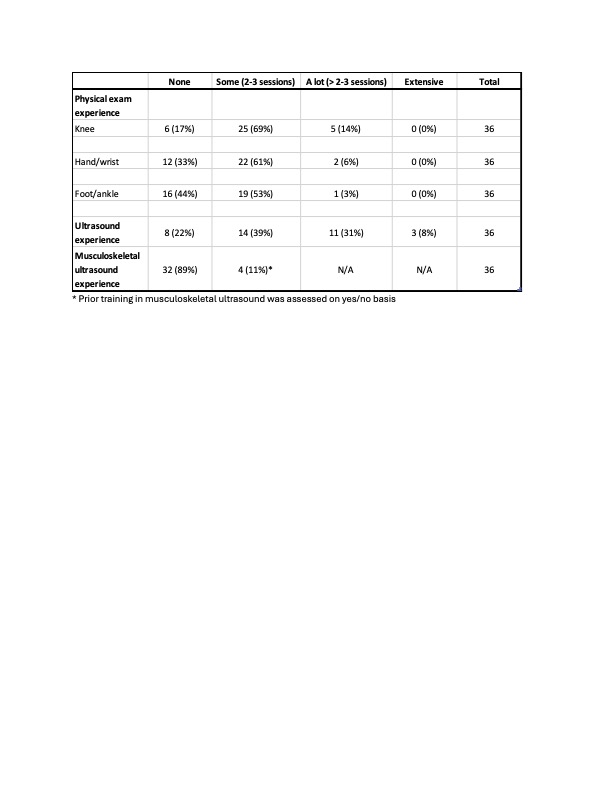Session Information
Session Type: Poster Session C
Session Time: 10:30AM-12:30PM
Background/Purpose: Poor confidence in musculoskeletal (MSK) care among practicing internists and internal medicine (IM) trainees is well described in the literature. A needs assessment of IM residents at our institution showed similar results with little training and low confidence in MSK physical examination (ACR 2024, abstract #1291). We implemented and evaluated a pilot MSK ultrasound (US) session on the knee for IM interns with the goals of improving knowledge of MSK anatomy, improving MSK physical examination, and optimizing arthrocentesis skills.
Methods: The pilot MSKUS session occurred in the fall of 2024 at a single academic residency program. The session included 30 minutes of didactic teaching on anatomy and an overview of 5 standard US views of the knee with both normal findings and common pathology. Following the didactic session, the interns split into small groups for 90 minutes of hands-on US practice, supervised by a rheumatologist. We surveyed participating interns on prior instruction in MSK exam and US, pre-post confidence in physical examination of the knee on a 1-6 scale (1 = not at all confident, 6 = extremely confident), and pre-post confidence in performing arthrocentesis of the knee on the same 1-6 scale. Survey questions were adapted from a survey on resident MSK exam confidence with evidence for validity (ACR 2014, abstract #1983). Finally, we administered an eight question pre- and post-session test to assess their knowledge of physical exam, anatomy, and US pathology of the knee. We analyzed data in aggregate using paired two sample T-tests.
Results: Thirty-six of 39 (92%) interns responded to the pre-session survey, and 34 of 39 (87%) interns responded to both pre- and post-session surveys. Most reported having 3 or fewer sessions in physical examination of the knee (n=31, 86%), hand/wrist (n=24, 94%), and foot/ankle (n=35, 97%) during their medical training (Table 1). Although 78% of interns reported prior POCUS training, only 11% reported prior training in MSKUS. Pre-session intern confidence in examination and arthrocentesis of the knee was very low, with fewer than 25% rating >3/6 for any domain. Confidence in all domains was significantly improved post-session (Figure 1). MSK knowledge of the knee was significantly improved post-session for 6 of 8 questions, including those focused on physical exam (2 of 2), MSKUS pathology (1 of 1), anatomy (3 of 5). For the remaining 2 questions focused on anatomy, there was a trend toward improvement (Figure 2).
Conclusion: IM residents receive little training in MSK physical exam or MSKUS, and their confidence in performing MSK examination and procedures is low. Our prior needs assessment data suggests that this improves minimally over three years of IM residency. Intern participation in a targeted MSKUS training session was associated with improved confidence in MSK skills and improved MSK knowledge of the knee. Next steps include implementation of a longitudinal curriculum incorporating additional joint regions and the opportunity for time-distributed practice of MSKUS.
 Table 1: Interns were asked to quantify their experiences learning musculoskeletal physical exam and ultrasound by answering the following questions: “How much training have you had in physical examination of the following joints?”, “How much ultrasound training have you received in your medical training?”, and “Did your previous ultrasound training include any training in musculoskeletal ultrasound?”
Table 1: Interns were asked to quantify their experiences learning musculoskeletal physical exam and ultrasound by answering the following questions: “How much training have you had in physical examination of the following joints?”, “How much ultrasound training have you received in your medical training?”, and “Did your previous ultrasound training include any training in musculoskeletal ultrasound?”
.jpg) Figure 1: Intern knowledge about physical exam, anatomy, and musculoskeletal ultrasound pathology of the knee pre- and post-musculoskeletal ultrasound (MSKUS) session.
Figure 1: Intern knowledge about physical exam, anatomy, and musculoskeletal ultrasound pathology of the knee pre- and post-musculoskeletal ultrasound (MSKUS) session.
.jpg) Figure 2: Resident confidence in performing musculoskeletal physical exam and arthrocentesis of the knee pre- and post-musculoskeletal ultrasound (MSKUS) session.
Figure 2: Resident confidence in performing musculoskeletal physical exam and arthrocentesis of the knee pre- and post-musculoskeletal ultrasound (MSKUS) session.
To cite this abstract in AMA style:
Barr A, Leverenz D, Criscione-Schreiber L, Chu P. Teaching Musculoskeletal Ultrasound Improves Knowledge and Confidence in the Knee Exam: A Pilot Session with Internal Medicine Trainees [abstract]. Arthritis Rheumatol. 2025; 77 (suppl 9). https://acrabstracts.org/abstract/teaching-musculoskeletal-ultrasound-improves-knowledge-and-confidence-in-the-knee-exam-a-pilot-session-with-internal-medicine-trainees/. Accessed .« Back to ACR Convergence 2025
ACR Meeting Abstracts - https://acrabstracts.org/abstract/teaching-musculoskeletal-ultrasound-improves-knowledge-and-confidence-in-the-knee-exam-a-pilot-session-with-internal-medicine-trainees/
